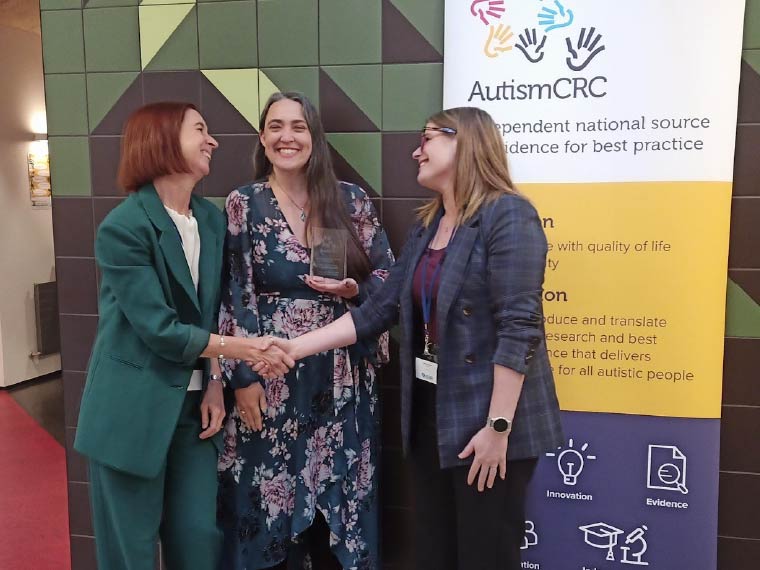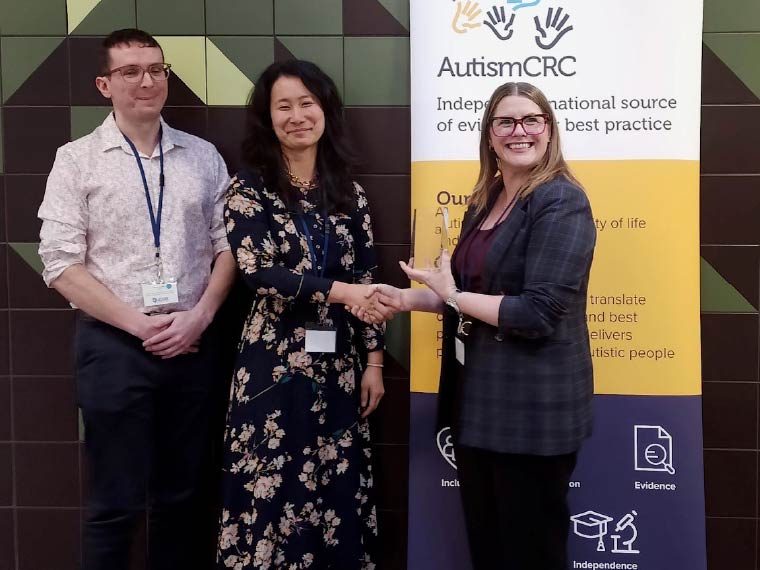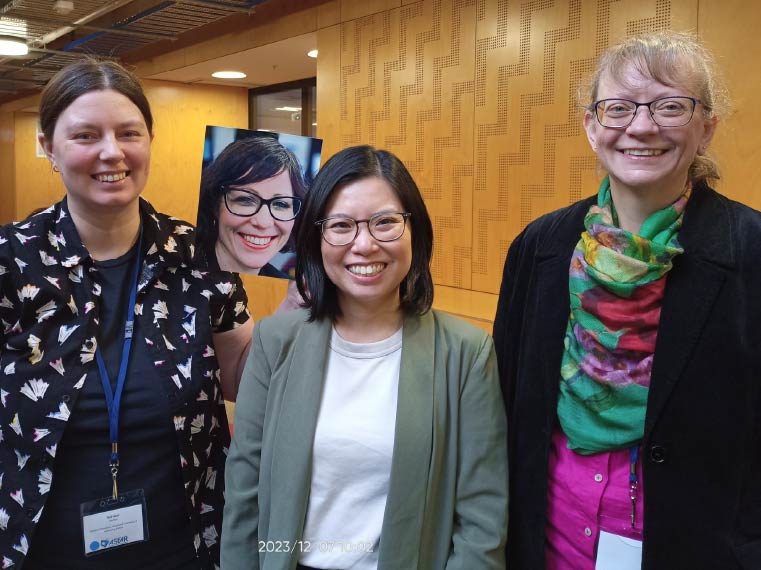Autism CRC Research Awards announced at ASfAR
Autism CRC is proud to announce the recipients of the 2023 Autism CRC Awards for Achievement in Autism Research.
Three projects have received recognition for their outstanding commitment to inclusive research practices and translation of autism research:
- Autism and Mental Health Mass Open Online Course
- Improving the mental health of autistic adults through the cultivation of self-compassion
- Autistic people’s university experience in Australia
The awards were announced at the Australasian Society for Autism Research (ASfAR) conference in Aotearoa New Zealand on December 7, 2023.
The awards acknowledge initiatives that exemplify Autism CRC’s vision, mission and values. In particular, they recognise achievements in inclusive research practice and the translation of autism research into practice, products, policy and programs that benefit the autistic and broader autism communities.
This year we received a record number of applications both nationally and internationally. The awardees demonstrated high levels of engagement with autistic individuals and the autism community across three very diverse projects that have the capacity to realise long term benefits.
We congratulate all of our 2023 award recipients and look forward to seeing the positive impact of their work.
Translation of autism research into practice
The Translation Research category was jointly awarded.
Autism and Mental Health Mass Open Online Course was led by Dr Wenn Lawson and Dr Ben Milbourne from the Curtin Autism Research Group.
This research was conducted to investigate the prevalence of contributing factors of specific mental health issues (such as depression and anxiety) in autistic individuals from a lived experience perspective. Twenty (20) autistic adults participated in the study which informed the development of a Mass Open Online Course (MOOC) focusing on autism and mental health.
The Autism and Mental Health MOOC was co-produced with autistic adults to empowering autistic people and those around them to promote their own good mental health, celebrate their individuality, strengths, and skills associated with autism, and to recognise when autistic individuals may need extra support.
This resulted in almost forty videos, focusing on building the strengths of neurodiverse individuals and allowing learners to access multiple perspectives and insights about autism and mental health from people with direct, lived experience. The MOOC includes a wide range of mental health issues and strategies, discussion prompts, quizzes, an interactive mental health questionnaire that provides tailored feedback, and an interactive learning style questionnaire.
Improving the mental health of autistic adults through the cultivation of self-compassion was led by Ru Ying Cai and Chris Edwards from Autism Spectrum Australia (Aspect).
People thrive in compassionate environments. This research aimed to cultivate autistic people’s self-compassion as an antidote to the negative experiences associated with unsupportive environments to improve mental health and wellbeing. The project was delivered in two phases.
The aim of Phase 1 was to examine the self-compassion experiences of autistic and non-autistic adults and identify the relationships between self-compassion, emotion regulation, and mental health in autistic adult using a mix of online surveys and interviews.
It was found that the autistic adults in the study (n = 153) self-reported lower self-compassion levels than the non-autistic adults (n = 93). It was also found that higher levels of self-compassion were significantly associated with better emotion regulation abilities, lower symptoms of anxiety and depression, and better psychological wellbeing within the sample of autistic adults. When the data was analysed further, it was found that self-compassion influenced good mental health through better emotion regulation.
Phase 2 consisted of the co-design and co-production of the Aspect Self-compassion Program for Autistic Adults (ASPAA) based on the findings from phase 1 and was piloted with 39 Australian autistic adults.
The ASPAA included lived experience videos of autistic adults talking about their self-compassion and self-critical experiences and tailored self-compassion practises.
Overall, participants who completed this program had increased self-compassion levels, psychological wellbeing, positive affect, decreased negative affect, emotion regulation difficulties, and symptoms of anxiety and depression.
Inclusive research practice
Autistic people’s university experience in Australia was led by Dr Diana Tan from Macquarie University and University College London.
The aim of this study was to investigate the accessibility of higher education with a focus on learning why the rate of course completions of people with disability is so low despite the growing number of students with disability enrolling in universities in the last few decades.
The study asked 21 autistic people about their lived experience studying at Australian universities as current students, graduates or those who discontinued their studies.
Four key themes emerged:
- “my disability is something that people just don’t have a clue about”
- “the system is really stacked against you”
- “the onus is on autistic students”
- “grit and stubbornness”
From the research, the team put forth four recommendations to improve autistic student’s university experiences:
- Improving autism knowledge for university staff and students
- Developing safe and appropriate channels for students to report discriminatory practices
- Harnessing autistic student’s knowledge and experiences in co-designing better support services and resources for autistic students
- Implementing universal design for learning to overcome some issues with inaccessibility.
These findings were co-presented at the International Society for Autism Research in 2022.
The Autism CRC Awards for Achievement in Autism Research are open to all organisations and researchers undertaking quality research projects related to autism, regardless of location or affiliation with Autism CRC. We thank everyone who took the time to submit a nomination to this year’s event.



First image: Professor Sonya Girdler and Professor Sonya Girdler from the Curtin Autism Research Group accepting the award for Autism and Mental Health Mass Open Online Course from Cheryl Mangan, Manager, Research Translation, Autism CRC.
Second image: Dr Chris Edwards and Dr Ru Ying Cai accepting the award for Improving the mental health of autistic adults through the cultivation of self-compassion from Cheryl Mangan, Manager, Research Translation, Autism CRC.
Third image: Tori Haar, Professor Liz Pelicano (represented by photograph), Dr Diana Yan and Marion Rabuka from the Autistic people’s university experience in Australia at ASFAR 2023 (image from @dianawtan22 on X.com).